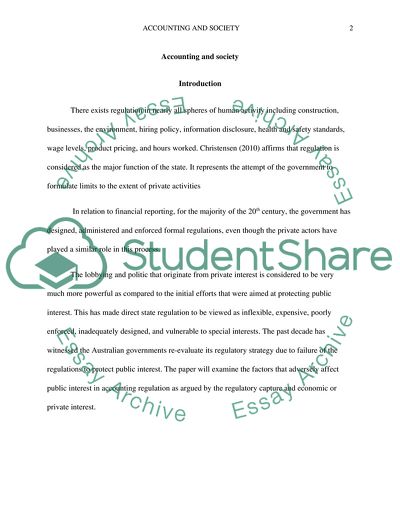Cite this document
(A major perspective on accounting (financial reporting) regulation Essay, n.d.)
A major perspective on accounting (financial reporting) regulation Essay. https://studentshare.org/finance-accounting/1821340-a-major-perspective-on-accounting-financial-reporting-regulation-views-regulation-as-being-required-to-protect-the-public-interest-however-the-regulatory-capture-and-economic-private-interests-perspectives-argue-that-the-public-interest-objective-co
A major perspective on accounting (financial reporting) regulation Essay. https://studentshare.org/finance-accounting/1821340-a-major-perspective-on-accounting-financial-reporting-regulation-views-regulation-as-being-required-to-protect-the-public-interest-however-the-regulatory-capture-and-economic-private-interests-perspectives-argue-that-the-public-interest-objective-co
(A Major Perspective on Accounting (financial Reporting) Regulation Essay)
A Major Perspective on Accounting (financial Reporting) Regulation Essay. https://studentshare.org/finance-accounting/1821340-a-major-perspective-on-accounting-financial-reporting-regulation-views-regulation-as-being-required-to-protect-the-public-interest-however-the-regulatory-capture-and-economic-private-interests-perspectives-argue-that-the-public-interest-objective-co.
A Major Perspective on Accounting (financial Reporting) Regulation Essay. https://studentshare.org/finance-accounting/1821340-a-major-perspective-on-accounting-financial-reporting-regulation-views-regulation-as-being-required-to-protect-the-public-interest-however-the-regulatory-capture-and-economic-private-interests-perspectives-argue-that-the-public-interest-objective-co.
“A Major Perspective on Accounting (financial Reporting) Regulation Essay”. https://studentshare.org/finance-accounting/1821340-a-major-perspective-on-accounting-financial-reporting-regulation-views-regulation-as-being-required-to-protect-the-public-interest-however-the-regulatory-capture-and-economic-private-interests-perspectives-argue-that-the-public-interest-objective-co.


